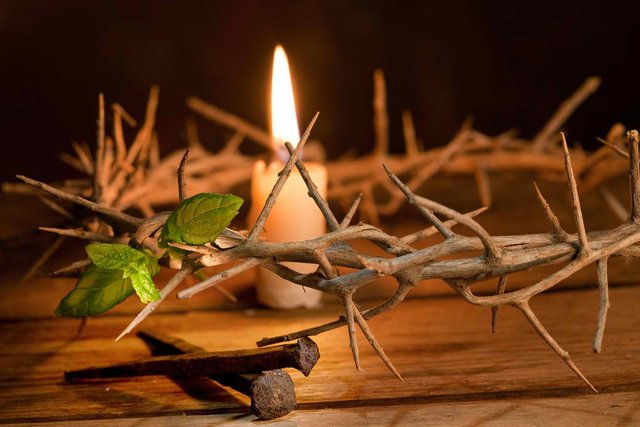WHY JUST JESUS CHRIST HAVE TO DIE?The passover Page 1.
Why Did Jesus Christ Have to Die?
Most of us have heard that Jesus Christ died for our sins, but what does that really mean? Why was His death necessary?crown of thorns and stakes Designpics

Jesus’ sacrifice, the central message of the Passover, was a supreme act of love for humanity. This important event laid the foundation for the remaining annual Holy Days and festivals.
Most of us have heard that Jesus Christ died for our sins, but what does that really mean? Why was His death necessary? What part does Christ’s sacrifice play in God’s plan for mankind? How is Jesus Christ’s death reflected in God’s holy festivals? This chapter on the New Testament Passover will address these important questions.
Christ’s sacrifice is the pivotal event in God’s plan to save humanity. Jesus foretold the fact that He would be “lifted up” in crucifixion so that “whoever believes in Him should not perish but have eternal life. For God so loved the world that He gave His only begotten Son, that whoever believes in Him should not perish but have everlasting life” (John 3:14-16).
We see here that Jesus’ sacrifice, the central message of the Passover, was a supreme act of love for humanity. This important event laid the foundation for the annual festivals that would follow. It is the most momentous step in God’s plan.
Just before the Passover feast that would see His execution, Jesus said that “for this purpose I came to this hour . . . And I, if I am lifted up from the earth, will draw all peoples to Myself” (John 12:27, John 12:32).
The day on which this profound event, the crucifixion, transpired was the 14th day of the first month of God’s calendar, the very same day on which the Passover lambs were to be slain (Leviticus 23:5). Paul would later tell the congregation at Corinth that “Christ, our Passover, was sacrificed for us” (1 Corinthians 5:7).
Now let’s look back through the Bible for the instructions and meaning God gave concerning this day. Doing so will help us understand why God expects us to continue observing the Passover.
God’s Passover instruction
As previously mentioned, God through Moses told Pharaoh, “Let My people go, that they may hold a feast to Me in the wilderness” (Exodus 5:1). Through a series of plagues, God displayed His great power and delivered the Israelites from slavery in Egypt. After nine plagues He gave Israel specific instructions about the next and final terrifying calamity and the steps each Israelite family would have to take to escape it.

The unblemished male lamb represented Jesus Christ as the perfect, sinless sacrifice for our sins.
God said that on the 10th day of the first month (in the spring in the Middle East) each Israelite was to select a lamb or goat large enough to feed each household (Exodus 12:3). The animal chosen was to be a yearling male without any sort of defect. On the 14th day of that month at evening, the Israelites were to kill the animals and place some of their blood on the doorposts of their homes. The animals were then to be roasted and eaten along with unleavened bread and bitter herbs.
The Creator further instructed the Israelites that on this evening He would kill all the firstborn of Egypt to convince Pharaoh to release the Israelites from slavery. The firstborn of each Israelite family would be protected if the sign of the blood were on the entrance of their homes. God would “pass over” their homes to spare them—thus the meaning of the name of this observance (Exodus 12:13).
God said this day would be to the Israelites a memorial, “and you shall keep it as a feast to the Lord throughout your generations. You shall keep it as a feast by an everlasting ordinance” (Exodus 12:14). Bible writers later explained that the annual Passover observance symbolized Christ. Paul, as we just saw, referred to Christ as “our Pass-over” (1 Corinthians 5:7), and the apostle John recorded that John the Baptist recognized Christ as “the Lamb of God who takes away the sin of the world!” (John 1:29).
The unblemished male animal represented Jesus Christ as the perfect, sinless sacrifice who died in our place, His death paying the penalty for our sins and reconciling us to God. Hebrews 9:11-12 tells us that “Christ came as High Priest of the good things to come . . . not with the blood of goats and calves, but with His own blood He entered the Most Holy Place once for all, having obtained eternal redemption.” Jesus Christ bought us with His blood, pouring out His life as our Passover lamb so our sins could be forgiven.
Why did Jesus Christ have to die? Our Savior had to die because in this way God could mercifully forgive our sins while maintaining the integrity of His law and perfect justice. The Bible tells us that sin is the violation of God’s law of love (1 John 3:4). We have all sinned and fallen short of the glory of God (Romans 3:23). We have each earned the death penalty for our disobedience (Romans 5:12; Romans 6:23).
Paul illustrated the profound love of Jesus Christ in giving up His life on our behalf (Romans 5:6-8). All would be doomed eternally had not the penalty for our sins been paid somehow. Christ, who lived a perfect life as the unblemished Lamb of God, substituted His death for ours. In fact, His death was the only possible substitution for ours. His sacrifice became the payment for our sins. He died in our place so we could share life with Him forever. We can no longer live according to our own desires. We become God’s redeemed,or bought and paid for,possession (1 corinthians 6:19-20) Both Jesus and Paul made it clear that the Passover is to continue as a Christian observance. Jesus Himself specified elements of the Passover meal that must still be ceremonially partaken of to teach Christians important truths about Himself and God’s continuing plan of salvation.
The Passover sacrifice in the Old Testament foreshadowed Christ’s crucifixion. The New Testament Passover memorializes that crucifixion. By observing the Passover, we “proclaim the Lord’s death till He comes” (1 Corinthians 11:26). Now let’s examine Christ’s specific instructions concerning the Passover ceremony and the lessons we should learn from it.
there are more we Continue to next page......
"And afterward Moses and Aaron went in, and told Pharaoh, Thus saith the LORD God of Israel, Let my people go, that they may hold a feast unto me in the wilderness."
Exodus 5:1
UPVOTE and RESTEEM

Nice post! I will follow you from now on.